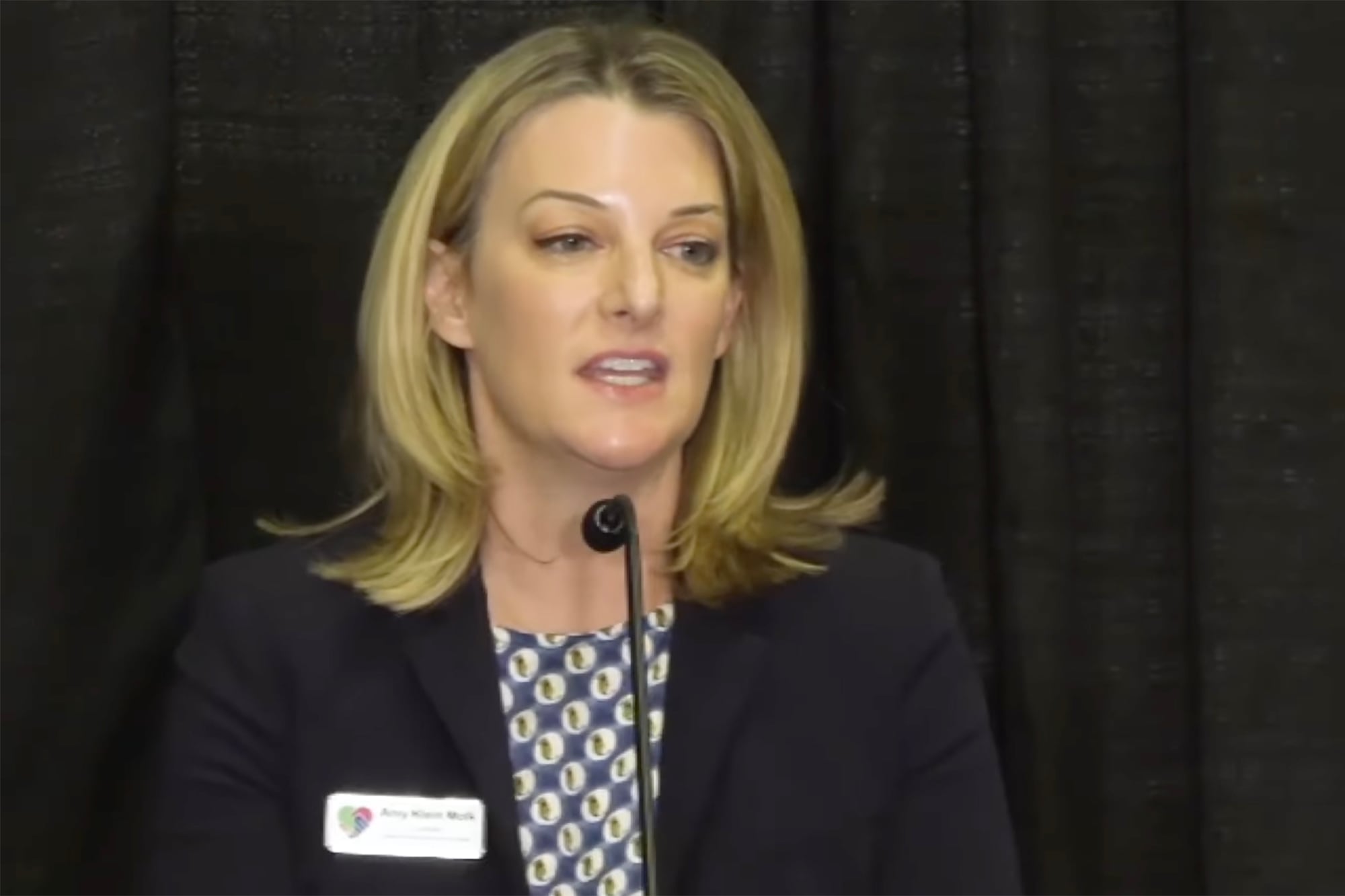Sign up for Chalkbeat Colorado’s free daily newsletter to get the latest reporting from us, plus curated news from other Colorado outlets, delivered to your inbox.
An attack ad in this year’s Denver school board election claims that candidate Amy Klein Molk replaced teachers at her former company with artificial intelligence.
The organization behind the ad says it’s highlighting for voters what Klein Molk has said in the past. Klein Molk says the ad is a lie that takes her words out of context.
Klein Molk is running for an at-large seat on the Denver school board. That seat, which represents the entire city, is one of four up for grabs on Nov. 4. The election could shift the political majority on the board of Colorado’s largest school district, which has been controlled for the past six years by members backed by the teachers union.
Klein Molk was endorsed by the Denver Classroom Teachers Association. She is the mother of two Denver Public Schools students and worked last year as a special education paraprofessional at Denver’s Park Hill Elementary School.
Before that, Klein Molk worked in the entertainment industry and founded an educational technology company called Beanstalk. The company launched in 2020 and provided free live, virtual lessons over Zoom for children ages 3 to 6.
Klein Molk said the lessons were developed by experts who held doctorate degrees in early childhood development and delivered by content creators and actors. In some media interviews and promotional videos from the time, Klein Molk referred to the people delivering the lessons as teachers. But she told Chalkbeat that the content creators were not licensed teachers.
A mailer, digital ad, and website funded by a group that’s supporting Klein Molk’s opponent say Klein Molk decided to fire all of the teachers at Beanstalk and replace them with AI. The website links to a podcast on which Klein Molk told the host that she let the Beanstalk production staff go in order to fund “a pivot with AI.”
On the podcast, Klein Molk described the pivot as “creating AI-powered real-time animated kids’ characters” that would allow preschoolers to “interact and engage with a character who talks back, who sees them, who hears them.” She said the pivot was needed because preschoolers were returning to in-person learning and could no longer join the live lessons during the day.
In an interview with Chalkbeat, Klein Molk said Beanstalk folded in late 2022, and the AI pivot never happened.
The podcast was a “hopes and dreams conversation,” Klein Molk said, in which she was “talking about an opportunity to pivot, which as an entrepreneur and as somebody who never gives up, there’s always hope that maybe you’re going to find the answer so you can live one more day. Unfortunately for me, and 90% of other startups, that was the end. We didn’t live another day.”
Klein Molk said the attack ad uses clips from the podcast to take what she said out of context. The ad uses a clip of Klein Molk saying she “was really proud” and implies that’s how she felt after letting staff members at Beanstalk go. On the podcast, Klein Molk said she was proud of her failures because failure is how people learn and grow.
The mailer, ad, and website were funded by an independent expenditure committee called Better Leaders, Stronger Schools. The mailer says of Klein Molk and her previous comments on AI that “Denver teachers and students deserve better.”
Better Leaders, Stronger Schools is largely funded by an advocacy group called Denver Families Action. That group has endorsed Klein Molk’s opponent, Alex Magaña, who is a longtime educator and the executive principal of two middle schools in Denver.
Dan Aschkinasi, the registered agent for Better Leaders, Stronger Schools, said that the committee took Klein Molk’s own words and amplified them for voters.
“I think it’s important for voters to know what these candidates have done in their past and what their decisions have been in pressure situations related to budgeting and the direction of an entity,” Aschkinasi said.
“I can’t think of a more interesting time in education right now to be having this discussion of when push comes to shove related to AI technologies and how you’ve used them and what you’ve done,” he said.
Klein Molk said the ad and mailer are “dark money lies that are fueled by out-of-state billionaires who are pouring money into this race.”
Denver Families Action has received funding from an organization called City Fund Action, which is the political arm of an organization called the City Fund, the vice president of a public affairs and political consulting firm that works with the City Fund said. The City Fund has in the past been funded by Netflix founder Reed Hastings and Texas philanthropist John Arnold, both of whom sit on the boards of the City Fund and City Fund Action.
Campaign finance reports show Better Leaders, Stronger Schools has spent more than $120,000 on ads and mailers opposing Klein Molk. Students Deserve Better, an independent expenditure committee funded by teachers unions, has spent $100,000 on an ad opposing Magaña. Independent expenditure committees cannot coordinate with the candidates.
Correction, Oct. 31: This story has been updated to reflect that City Fund Action, not the City Fund, has given money to Denver Families Action.
Melanie Asmar is the bureau chief for Chalkbeat Colorado. Contact Melanie at masmar@chalkbeat.org.







